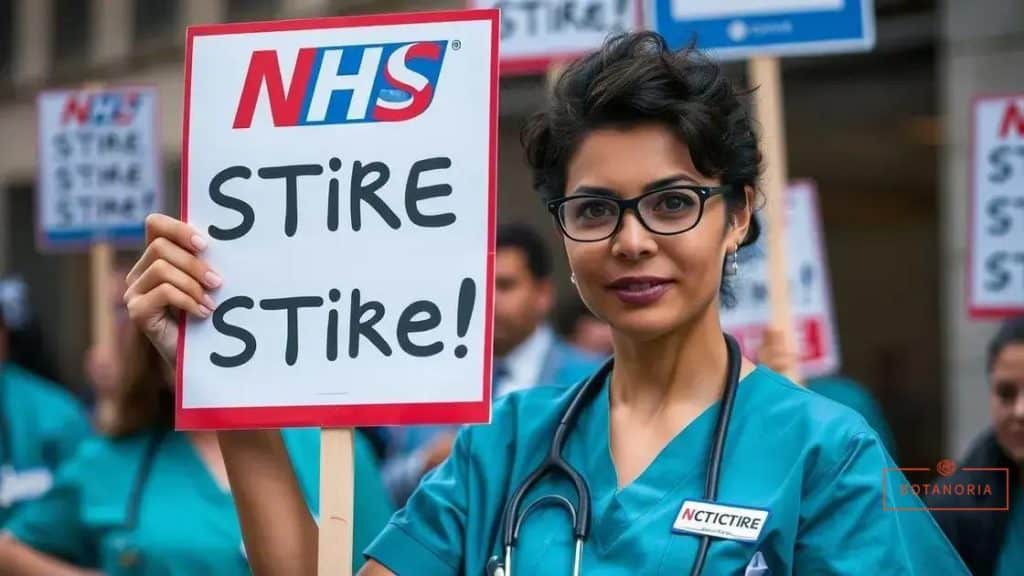NHS strike updates 2025: what you need to know

Anúncios
The NHS strikes in 2025 focus on fair pay, improved working conditions, and adequate support for healthcare workers, significantly affecting patient care and prompting ongoing negotiations with the government.
NHS strike updates 2025 are more important than ever as healthcare workers push for better conditions and pay. These developments could significantly affect patient care, and it’s essential to stay updated on the situation. Are you curious about how these changes might influence the NHS?
Anúncios
Overview of the NHS strikes in 2025
The NHS strikes in 2025 mark a significant moment in the history of healthcare in the UK. Understanding what led to these strikes is crucial for everyone. Workers across multiple NHS sectors have united to advocate for better working conditions and fair pay.
Many argue that the demands for change are essential for maintaining quality patient care. In this context, let’s delve deeper into the causes and implications of the strikes.
Key Issues Driving the Strikes
Several factors have contributed to the escalations we are witnessing. First, the staffing shortages have become increasingly critical. Many healthcare professionals feel overwhelmed and underappreciated, leading to significant stress and burnout.
Anúncios
- Low pay: Healthcare workers often report inadequate salaries compared to their responsibilities.
- Working conditions: Suboptimal working environments are affecting morale and efficiency.
- Lack of support: Employees feel there is insufficient mental health support and resources.
- Patient care concerns: Ultimately, these strikes reflect worries about how patient care will be maintained if these issues aren’t addressed.
This combination of factors has fueled anger and frustration among NHS staff. Many feel that their concerns are being ignored, prompting them to take action. Furthermore, the public’s support for these workers has been growing, highlighting the widespread recognition of the challenges faced in the NHS.
Impact on Healthcare Services
As the strikes continue, it’s important to consider how they will affect healthcare delivery. Appointments and surgeries are being postponed, causing concerns for patients who rely on timely medical assistance. This leads to a ripple effect on overall health outcomes in the community.
Moreover, public health campaigns and preventive services may face interruptions as workers focus on the strikes instead of their usual duties. The implications for healthcare accessibility are becoming more prominent as discussions around negotiations evolve.
The NHS strikes in 2025 serve as a reminder of the ongoing challenges faced by one of the country’s most vital institutions. As events unfold, staying informed will be key to understanding both the immediate and long-term impacts on healthcare in the UK. The situation encourages a deeper conversation about how to ensure that the NHS can continue to provide quality care and support to all its patients.
Key demands from healthcare workers

The key demands from healthcare workers during the NHS strikes in 2025 reflect deep-rooted issues in the healthcare system. These demands are not just about pay—they also encompass working conditions and support staff need to effectively care for patients.
Fair Compensation
One of the primary demands is for fair wages. Healthcare professionals feel their salaries do not match the level of responsibility they handle daily. As inflation rises, many find it difficult to make ends meet.
- Increased base salary: A call for a substantial raise to reflect the expertise and efforts of NHS staff.
- Regular pay reviews: Ensuring that compensation keeps pace with the cost of living.
- Performance incentives: Encouraging excellence and dedication among healthcare providers.
Beyond salary, the conversation surrounding working conditions is pivotal. Many workers report that understaffing is manageable but detrimental to both staff and patient care. The short-staffing crisis has resulted in excessive workloads. When healthcare workers are overworked, patient safety suffers. Striking workers emphasize the need for better staffing ratios to ensure quality care.
Improved Support Services
Healthcare professionals are also demanding increased mental health support and resources. High-stress environments are prevalent in the NHS, leading to burnout among staff. Support groups and mental health services can help mitigate this issue.
Advocates suggest implementing training programs that focus on resilience and self-care, which can enhance overall well-being. Providing easy access to counseling and therapy options can make a significant difference in the daily lives of these workers. Overall, these demands highlight the urgency for addressing the challenges facing NHS workers.
Impact on patient care and services
The impact on patient care and services during the NHS strikes in 2025 is a major concern for both healthcare workers and patients. With staff members walking out, the healthcare services are facing unprecedented challenges. Patients are feeling the effects of these strikes in various ways, highlighting the urgency of the situation.
Delayed Treatments
One significant impact is the delay in treatments and surgeries. Many scheduled appointments are being rescheduled or canceled altogether, forcing patients to wait longer for essential care. For those with chronic conditions, these delays can lead to worsened health outcomes.
- Increased wait times: Patients may face longer waits for consultations and procedures.
- Postponed surgeries: Elective surgeries are especially vulnerable to cancellations.
- Follow-up care disruptions: Regular check-ups and follow-ups are also affected.
In addition, the quality of care provided during these strikes is at risk. While some healthcare workers continue to operate under duress, the overall capacity is reduced. This situation can lead to increased stress among remaining staff members, which further affects the standard of care they can provide.
Patient Safety Concerns
Patient safety is another pressing concern. When staffing levels fall, risks such as medication errors or overlooked symptoms may rise. Patients may not receive timely attention, which is critical in emergency situations.
Moreover, less available personnel means that existing staff may not have adequate time to monitor patients closely. This can compromise overall patient care. The emotional toll on both staff and patients can be significant, as families grow anxious about the status of their loved ones.
Overall, the NHS strikes have sparked a crucial dialogue about the sustainability of healthcare services. As pressure increases on healthcare workers, the repercussions for patient care and safety become increasingly evident, underscoring the need for immediate solutions.
Government response to the strikes

The government response to the strikes has been a focal point of discussions surrounding the NHS in 2025. As healthcare workers voice their concerns and demand change, the government must navigate complex political and social landscapes.
Initial Reactions
At first, the government expressed disappointment over the strikes. Officials emphasized the need for negotiation and dialogue, arguing that strikes could further harm the already strained healthcare system. Many believe that an effective response is essential to maintain public trust.
- Encouragement of discussions: The government has urged both sides to come to the table and resolve their differences.
- Proposals for negotiations: Initial proposals might include revisiting pay structures and working conditions.
- Public communication: Keeping the public informed is crucial to maintain transparency during this crisis.
Despite these efforts, many healthcare workers feel that the government’s response does not address the urgency of their demands. They argue that promises for future negotiations do little to alleviate their present struggles.
Proposed Solutions
The government has suggested reviewing budget allocations and exploring potential funding increases. However, this process can take time, which is frustrating for those directly affected by the strikes. Many are calling for immediate support measures, such as financial incentives or temporary staffing solutions.
Furthermore, discussions about reforming the healthcare system have emerged. Some officials propose more systemic changes that could help foster a better working environment for NHS staff, crucial for retaining and attracting quality professionals.
The government response is closely monitored by public opinion, and how it evolves will significantly impact the resolution of the strikes. Public sentiment is largely in support of healthcare workers, pushing the government to act more decisively.
Future of the NHS and ongoing negotiations
The future of the NHS and ongoing negotiations are major points of concern during these times of unrest. As healthcare workers continue to strike, the direction of the NHS remains uncertain. What happens now plays a crucial role in shaping the services and support provided to patients.
Negotiations between the government and healthcare unions are ongoing, and the outcomes could affect every aspect of healthcare delivery.
Potential Changes in Policies
One possible outcome of these negotiations is a shift in policies that address the root causes of dissatisfaction among NHS staff. Discussions may lead to reforms focused on improving working conditions.
- Increased funding: There may be promises for more financial support to enhance staff hiring and retention.
- Better benefits: Negotiations could also include improved benefits like mental health resources and paid leave.
- Streamlined processes: Simplifying administrative duties might enable healthcare workers to focus more on patient care.
These potential changes stem from recognizing that a satisfied workforce leads to better patient outcomes. The public is also supportive, understanding that healthcare workers need these changes to deliver the care needed.
Challenges Ahead
However, challenges persist as both sides continue to navigate a complex political landscape. Resistance may arise from budget constraints or differing priorities within the government. Healthcare unions must advocate firmly to ensure that their voices are heard during the negotiation process.
It is vital for the negotiations to remain transparent to the public. Keeping the community informed helps build trust and encourages support for healthcare workers. The collaborative effort between NHS staff and the government could define a new era for healthcare in the UK.
As both sides continue to engage in discussions, the outcome will likely determine the long-term sustainability of the NHS. Ensuring that workers feel valued will ultimately lead to a healthier system for everyone.
FAQ – Frequently Asked Questions About the NHS Strikes 2025
What are the main reasons for the NHS strikes in 2025?
The main reasons for the strikes include demands for fair pay, improved working conditions, and adequate support for healthcare professionals.
How are patients affected by the NHS strikes?
Patients experience longer wait times for treatments and consultations, as many scheduled appointments and surgeries are postponed.
What is the government’s response to the NHS strikes?
The government has expressed disappointment and is encouraging negotiations while proposing reviews of funding and policies.
What might the future hold for the NHS after the strikes?
The future of the NHS depends on the outcomes of negotiations, which may lead to policy reforms and improved working conditions for healthcare workers.




